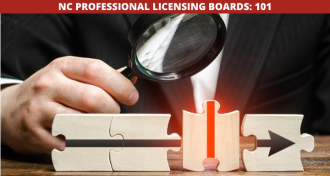For much of the last decade, North Carolina lawmakers have explored the concept of removing barriers to entry in a variety of professions and fields.
In fact, the topic has appeared in one form or another in every Regular Session of the North Carolina General Assembly since 2013. In some cases, these perceived barriers are the licenses or certificates issued by state licensing boards that an individual must secure in order to practice in a specific field. In others, the barriers involve acquiring reciprocity to practice an occupation across state lines. Years later, lawmakers continue to grapple with how much government intervention is appropriate in granting access to certain occupations.
In order to secure a license from a licensing board, applicants must meet a combination of education, testing, training, and other requirements set by the board. Although licensing boards determine their respective licensure requirements, the General Assembly establishes the boards and can change their authorizing statutes at any time. This gives the General Assembly a tremendous amount of influence over the scope and power of North Carolina's licensing boards.
Some lawmakers feel strongly that government should not stand in the way of a person doing a job unless it has a good reason to do so. This refrain is most common when unemployment figures are high and lawmakers are searching for creative ways to connect job seekers with occupations. Even in robust job markets the topic of licensure requirements often finds a way to resurface though.
State licensing boards traditionally have been vested with the power to oversee, credential, and discipline their licensees for the purpose of protecting the health, safety, and welfare of the general public. It is hard to argue with the value of that protection in the case of medical licenses and general contractor licenses, but the benefit of a license is less tangible in some other fields. Over the last several years, lawmakers have steadily evaluated the value against the burden of a handful of state licenses that fall in the latter category.
These discussions reached a peak in North Carolina in 2015, 2016, and 2017 when several studies were authorized and many pieces of legislation introduced to scale back the number of licensing boards and licensed occupations in our state. See here for more details on the modern legislative history surrounding North Carolina's licensing boards.
A December 2014 report from the General Assembly's Program Evaluation Division recommended the outright elimination of 12 of the state's licensing boards and the consolidation of 10 others. The response to this report was overwhelming and throngs of advocates and concerned individuals came to the defense of the boards recommended for elimination. The report inspired several pieces of legislation in the years immediately following. As a result of this legislation, several boards (and the licenses they issued) were ultimately eliminated. Many more licensing boards were consolidated with each other. Since then, the topic has cooled but has not faded entirely.
Just last month, the North Carolina General Assembly's Administrative Procedure Oversight Committee met to discuss the consolidation of three of the state's licensing boards with related state boards: the North Carolina Acupuncture Licensing Board, the North Carolina State Board of Examiners of Fee-Based Practicing Pastoral Counselors and the North Carolina Board of Athletic Trainers. Representatives and licensees from each group attended the hearing in opposition to the potential consolidation. They argued the value of their respective licenses and the need for their respective Boards to remain autonomous.
Lawmakers aren't the only people working to alleviate barriers to entry in certain professions. Sometimes the licensees themselves request legislative changes to make it easier for them to serve the public.
For example, in 2021 licensed counselors requested legislation to establish an interstate compact for the practice of professional counseling. A bipartisan group of House members introduced that legislation for them in the form of House Bill 791 – Licensed Counselors Interstate Compact. If enacted, House Bill 791 would facilitate the interstate practice of professional counselors by allowing them to practice in other states that have adopted the same compact. The House passed the bill unanimously last July and it now awaits a hearing in the Senate. A similar bill to establish an interstate compact for the practice of medicine (Senate Bill 380 – Interstate Medical Licensure Compact) was also filed last spring, although it has not found as much success.
The coronavirus pandemic challenged policy makers to consider softening certain licensing requirements again as demand for certain professionals, particularly health care workers, skyrocketed in the face of surges. Many state boards relaxed their licensure requirements to allow practitioners and retirees who held out-of-state or inactive licenses to begin working again in order to fill unmet needs in hard hit areas.
In times of crisis, it is easy to question why it matters which state-licensed a doctor and why we would let that distinction impede the flow of medical professionals across state lines, especially when lives are on the line. Surely a North Carolina COVID patient and a New York COVID patient would not differ simply because they fell ill in different states. Many lawmakers would argue that this scenario is an example of why some of the licensing parameters established by state boards are unnecessary and even counterproductive.
Licensing boards play a critical role in ensuring that the public is being served by professionals who have the necessary skills and qualifications to do so. Their ability to respond nimbly during times of crisis can further enhance their reputation for serving the public good. Even still, we expect the General Assembly will continue to explore ways to remove any barriers to entry it deems unnecessary.








